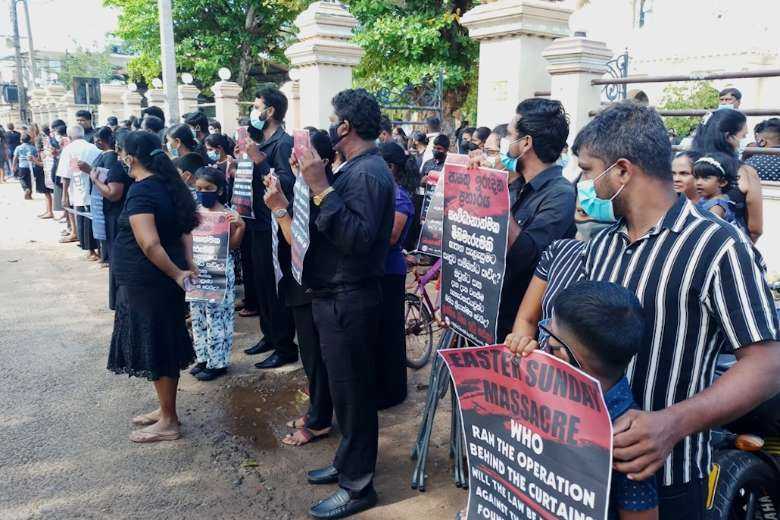
Sri Lankan Catholics dressed in black attend Sunday Mass and protest about the lack of justice for Easter Sunday bombing victims in Negombo on March 7. (Photo: UCA News)
Relatives of those killed and injured in the 2019 Easter Sunday attacks have filed legal cases against Sri Lanka’s former president, prime minister, senior police officers and others.
Nalini De Silva, who lost two of her sisters in the bombings, said justice has not been served as the second anniversary of the atrocity approaches on April 21.
She said that the petitions state that when intelligence services received a message warning of attacks, they ignored it, leading to deaths and serious injuries.
Nine suicide bombers affiliated to local Islamist extremist group National Thowheed Jamath (NTJ) targeted three Christian churches and three luxury hotels on April 21, 2019, killing 269 people and injuring more than 500.
The petitioners are seeking compensation from the respondents for the damage caused to their relatives by the failure to prevent the attacks.
The government has decided to take disciplinary action against nine senior police officers, including two inspector generals, who neglected their responsibilities during the attacks.
The attorney general has ordered the banning of 11 Islamic organizations allegedly involved in extremist activities in Sri Lanka. They are Jamiathul Ansari Sunnatul Mohammedia (JASM), Super Muslim Organization, Save the Pearls, United Tawheed Jamaat (UTJ), Ceylon Tawheed Jamaat (CTJ), Darul Adar and Jami ul Adar, Sri Lanka Islamic Students Association/Jamia (SLISM), ISIS Organization, Al Qaeda Organization, Sri Lanka Tawheed Jamaat (SLTJ) and All Ceylon Tawheed Jamaat (ACTJ).
Sri Lanka’s Catholic Church had urged the government to ban Muslim extremist groups that pose a threat to national security.
The Archdiocese of Colombo's declaration committee called on the government to identify foreign sponsors and preachers who sow hatred and urged it to expel them from the country.
Cardinal Malcolm Ranjith recently called on the government to take legal action against all those accused of negligence in the presidential commission’s report.
Former president and current MP Maithripala Sirisena stated in parliament on March 26 that if he had known about the Easter Sunday attacks in advance, he would have tried to prevent them.
Cardinal Ranjith has clearly said that if the government does not take action by the second anniversary of the attacks, the Church will take strong action to bring justice to the victims.
Church leaders declared March 7 as Black Sunday in a protest to demand justice for the victims. Thousands of Catholics dressed in black to attend Sunday Mass and held nationwide demonstrations outside all churches.
A large number of swords were found in mosques and other places after the suicide attacks. Cardinal Ranjith called on security forces to conduct investigations into the alleged importation of about 6,000 swords by a group of people.
Professor G.L. Peiris, minister of education, stated in parliament that the government will ensure that such a catastrophe does not happen again.
"The commission report has recommended that a special panel of judges be appointed to hear the cases related to the attack without delay for weeks or months," he said.
Peiris said Sri Lanka has about 365 registered madrasas (Islamic schools). "There are several other such institutions and some regulation is essential for this."
He said government intervention is essential in determining the curriculum taught in these schools, who teaches them and how they raise money.
Minister of Public Defense Sarath Weerasekera said the government would soon ban the burqa as a matter of national security.
"There are over 1,000 unregistered madrasas which have not been registered under the national education policy and necessary steps will be taken to close them due to lack of proper regulation," said Weerasekera.
In the Buddhist-majority nation, the wearing of burqas was also temporarily banned in 2019 after the Easter attacks.
Identified as masterminds
Weerasekera said Naufar Moulavi and Hajjul Akbar have been identified as the masterminds behind the attacks.
He said that Saharan Hasim, a suicide bomber involved in the attacks, had been supported by Moulavi.
The US Department of Justice has charged Moulavi and two others with conspiring to provide material help to the Islamic State, which claimed responsibility for the attacks.
Silva said that Catholics have called for the government to seize weapons that have been imported into the country and for the speedy confiscation of financial resources and property that nurture extremist terrorism.
"Otherwise, when it turns two years, the government will tell different stories. If justice is to be done to the victims, all involved must be punished," said Silva.


